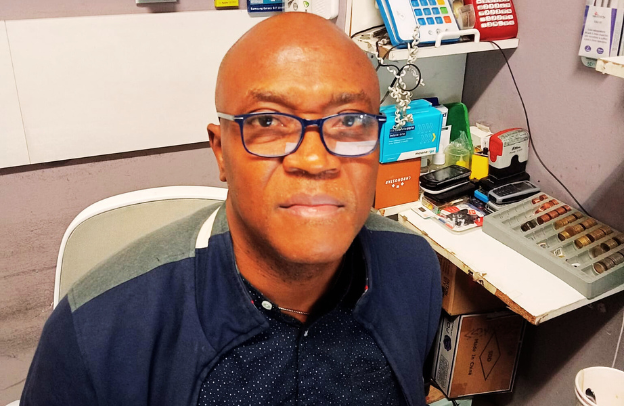The Entrepreneurial Spirit of Nigerians Abroad – A Conversation with Akinola Muiz, Verona, Italy

As I stepped into Akinola Muiz’s small shop in Porto San Pancrazio, Verona, I was immediately struck by the bustling energy that filled the space. The hum of conversation, the clatter of mobile phones being repaired, and the flow of customers coming in for money transfers—all of it spoke to the hard work and dedication Akinola had poured into this business.
Want to learn more about storytelling? Start by downloading the first chapter of The Storytelling Mastery.
For eight years, he has provided essential services to his local community, blending technology, customer care, and cultural connection into a thriving small enterprise.
Akinola is not alone. Nigerians in the diaspora have become some of the most successful African entrepreneurs worldwide, building businesses that serve their communities and beyond.
Today, I’m here to talk with him not just about his work, but about the broader phenomenon of African entrepreneurship abroad, a topic I have been researching previously through one-on-one interviews and conversations now mostly using the platform of Obehi Podcast.
What began in 2013, as a small research project in Verona, Italy, has since evolved into a powerful platform connecting the vast African diaspora, which numbers in the hundreds of millions across the globe.
Today, this initiative continues to grow through weekly LinkedIn audio live events, where we explore the art of storytelling—a theme central to my 2023 five-part book series, The Storytelling Mastery. This series emerged directly from the insights gathered during the research, building on two earlier works, The Journey: Africans in Verona and The Color of Our Children.
Together, these conversations and books represent the ongoing evolution of the research, expanding our reach and deepening our engagement with the global African diaspora community.
Over the years, I have spoken with many African business owners in Europe the United States, Canada, and other parts of the world, and what stands out is not just the resilience of these entrepreneurs but their deep sense of purpose.
Of course, it’s no secret that Nigerians are among the most prominent in the African diaspora, often credited with their entrepreneurial spirit and ability to adapt to new environments.
Whether you are in the streets of Paris, London, or New York, you must have come across this entrepreneurial sprite of Nigerians in action, both on a small or large scale.
See also Best Marketing Strategies for Small and Medium-Scale Farmers in African Agribusiness
While Nigeria’s large population is certainly one factor, there’s something more profound at play. Nigerian entrepreneurs are bringing a unique blend of creativity, community, and business savvy to the global stage, and there’s much that other members of the African diaspora can learn from their example.
Nigerian Success Stories: What Drives Diaspora Entrepreneurs?
When I asked Akinola about his decision to start a business in Verona, his answer was simple but powerful: “My decision to establish this business is borne out of the need to offer quality service to my community.”
In that one sentence, he encapsulated a key trait that I have seen again and again in my conversations with Nigerian entrepreneurs abroad—an unshakable commitment to community service.
For many African immigrants, entrepreneurship isn’t just a means of survival but a way of giving back. It’s about creating something sustainable that helps both the entrepreneur and the community around them.
Akinola’s business, for example, caters not only to the local African diaspora but also to the Italian clients and people of non-African descent in the community. Whether it’s through phone repairs, software services, or money transfers, he’s meeting needs that might otherwise go unmet.
In fact, Nigerian immigrants have a long history of success in entrepreneurship. According to the Migration Policy Institute, Nigerians in the United States, for example, are one of the most educated immigrant groups, with 29% holding a graduate degree, compared to 11% of the overall U.S. population.
This level of education is often channeled into entrepreneurship. Many Nigerian immigrants leverage their knowledge and skills to start businesses, particularly in sectors like technology, healthcare, and retail services.
Akinola’s story is just one example of this broader trend. As I have discovered through my podcast interviews, Nigerian entrepreneurs often bring a sense of creativity and resourcefulness to their work, driven by a deep sense of purpose.
Whether they are in Italy, the United States, or Canada, these business owners are finding ways to blend their cultural heritage with modern business strategies, creating enterprises that are not only profitable but also deeply connected to their roots.
Entrepreneurship in the African Diaspora: The Case of Akinola Muiz
As our conversation continued, I delved deeper into Akinola’s journey. “The experience has been great,” he said when I asked how things have gone since he started his business. “We are not complaining.” It was a modest response, but one that belied the hard work and perseverance that goes into running a small business in a foreign country.
Akinola’s shop offers a range of services, from phone repairs to money transfers, and it’s clear that he has carved out a niche for himself in the local community.
What struck me most was his genuine desire to serve. “We are into sales and repair of mobile phones, software, hardware, money transfer, and courier services,” he explained. “Our services are essential to both the African community here and to others living in Verona.”
His business in the suburb of Verona (Porto San Pancrazio) is more than just a transaction; it’s a lifeline for many who need affordable services or a way to stay connected with family back home.
See also The Story Of The African Museum Of Verona Since 1938
Money transfer services, in particular, play a crucial role in the lives of many Africans in the diaspora, allowing them to send remittances to support loved ones. In fact, according to the World Bank, remittances to sub-Saharan Africa reached over $48 billion in 2020, with Nigeria being the largest recipient.
Akinola’s shop is a small but essential part of this larger system, helping to facilitate the flow of money and resources between the diaspora and their home countries.
Meanwhile, it’s also a reminder that entrepreneurship in the African diaspora isn’t just about making money; it’s about creating value and connections across continents.
Navigating the Challenges of the Italian Market
Of course, running a business in a foreign country comes with its challenges. When I asked Akinola about the difficulties he’s faced, he admitted, “Well, like other businesses, there will surely be challenges, but we are optimistic that they can be overcome.”
His optimism is typical of many African entrepreneurs I have spoken with, who often see obstacles as opportunities for growth.
In Italy, for instance, African business owners must navigate a complex regulatory environment, linguistic barriers, and sometimes even subtle forms of discrimination and racism among some locals. Yet, these Africans persist, often relying on their resourcefulness and adaptability to make things work.
Akinola’s story is one of resilience, and it mirrors the experiences of many African entrepreneurs across Europe. A 2019 study by the European Union found that African immigrants are more likely to start businesses than other immigrant groups in Italy, with many entering sectors such as retail, hospitality, and service industries.
While they face significant challenges, their contribution to the local economy is undeniable.
You might also like Why Hiring African Talent is a Win-Win: Support African Talent, Strengthen Your Business
For Akinola, the key to success lies in understanding the market and being flexible enough to adapt to its demands. “It’s a very dynamic environment,” he said, “and one should be mindful of the service he or she is offering.”
His words reflect the importance of market awareness and the need to stay relevant in a competitive business landscape.
Lessons for Creative Entrepreneurs in the African Diaspora
As our conversation turned to the future, Akinola expressed a clear vision: “We are looking forward to the future with an absolutely robust plan.”
This forward-thinking mindset is another trait I have noticed among African entrepreneurs. Despite the challenges they face, they remain optimistic and focused on long-term goals.
For creative entrepreneurs in the African diaspora, there are valuable lessons to be learned from people like Akinola. First and foremost, the importance of community cannot be overstated.
Many of the most successful African entrepreneurs I’ve spoken with are deeply connected to their communities, both locally and globally. They understand that their success is tied to the well-being of the people they serve.
In addition, there is a strong sense of purpose that drives these entrepreneurs. It’s not just about making money; it’s about creating something meaningful that has a positive impact on the world.
Whether it’s through offering essential services, creating jobs, or supporting family members back home, African entrepreneurs are finding ways to make a difference.
The Power of Storytelling in Diaspora Entrepreneurship
At the heart of every successful business is a compelling story. Akinola’s story, like so many others, is one of service, perseverance, and hope for the future.
As we wrapped up our conversation, I couldn’t help but reflect on how important storytelling is for African entrepreneurs. It’s not just about selling products or services; it’s about sharing a narrative that resonates with customers and builds trust.
Storytelling is a powerful tool for entrepreneurs, particularly in the creative industries. By sharing their journeys, challenges, and triumphs, entrepreneurs can create deeper connections with their audience.
This is especially important for those in the diaspora, who often face the dual challenge of building a business while also navigating the complexities of identity and belonging.
For creative entrepreneurs, the ability to tell their story authentically can be the key to standing out in a crowded market. It’s a way to differentiate themselves from competitors and to build a brand that is not only profitable but also meaningful.
Conclusion: The Future of African Entrepreneurship in the Diaspora
As I left Akinola’s shop, I felt a deep sense of pride—not just for him, but for the countless African entrepreneurs who are making their mark abroad. Their stories offer valuable lessons for anyone in the creative and purpose-driven space.
They show us that with resilience, community, and a clear sense of purpose, it’s possible to thrive—even in the most competitive and challenging environments.
For creative entrepreneurs in the African diaspora, now is the time to own your story and stand out. Learn from the experiences of others, embrace your unique identity, and continue to build businesses that not only serve your community but also make a lasting impact on the world.
Whether you are in Italy, the United States, or anywhere else, the opportunities are there—you just need to seize them.
Want to learn more about storytelling? Start by downloading the first chapter of The Storytelling Mastery.





